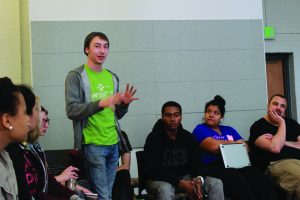By Cory A. Thompson – [email protected] – Asst. A&F Editor
Students from UNC Asheville’s Active Students for a Healthy Environment gathered with the statewide Student Energy Network at a conference in Raleigh to train for the upcoming battle against Duke Energy’s nonrenewable power monopoly.
“Our generation sees a future that does not rely on fossil fuel,” said Leigh Whittaker, president of UNCA’s SGA. “We take pride in being a green university, and it’s time to take a stand.”
Whittaker recently signed a document endorsing a resolution demanding Duke Energy provides 100 percent renewable energy across all UNC campuses by 2050. The document needs four more endorsements before it appears on the floor of the UNC Association of Student Governments this February.
“Although 100 percent renewable energy does not seem completely feasible, it’s not impossible,” said Whittaker, an environmental policy student. “We just need to stand together and demand change.”
Duke Energy owns 83 percent of N.C.’s electrical grid and largely powers it with eight in-state coal power plants. According to Duke Energy, they plan to work renewable energy into 2 percent of their overall electrical output.
According to Caroline Hansley, Student Energy Network coordinator, Duke’s plan requires reworking.
“Duke is the third largest emitter of carbon pollution in the United States, and the UNC system is one of Duke’s largest clients,” said Hansley, a senior at North Carolina State University. “With the $225 million we give them each year, we have the buying power. We need to sit down with Duke Energy officials and demand renewable energy.”
The cost of electrical utilities adds up to approximately $1,000 per student per year, which will continue to increase as Duke Energy spikes rates in accordance with the rising cost of coal. Switching to renewable energy will save the university system $1 billion dollars over 20 years, according to Hansley.
“Our initiative has been building momentum, but there is a stark need for students to coordinate to bring about the goal,” Hansley said.
To accommodate the rising need for manpower and coordination, Hansley’s group reaches out to professionals both within and outside of the university system. The Student Energy Network also hosts educational conferences to train student activists.
Garrett Ring, chair of ASHE, said he brought several delegates to Raleigh for one such conference last weekend.
“I learned about how to create partnerships between my student organization and off-campus initiatives,” said Ring, a junior environmental management and policy student. “We’ve got to be persistent, committed and willing to adapt to the needs and styles of our partner organizations.”
In addition to the Duke Energy initiative that resulted in Whittaker’s signature on the clean energy endorsement, ASHE members said they plan to adopt W.T. Weaver Boulevard.
“We’d like to bring the local community and area schools together around a common goal,” Ring said. “Organizing clean ups and plantings on Weaver would go a long way to bring the community together.”
Ring said consistency builds trust between student organizations and the community.
“College students in general have a reputation for flaking,” Ring said. “We need to be professional and follow through with our goals.”




















